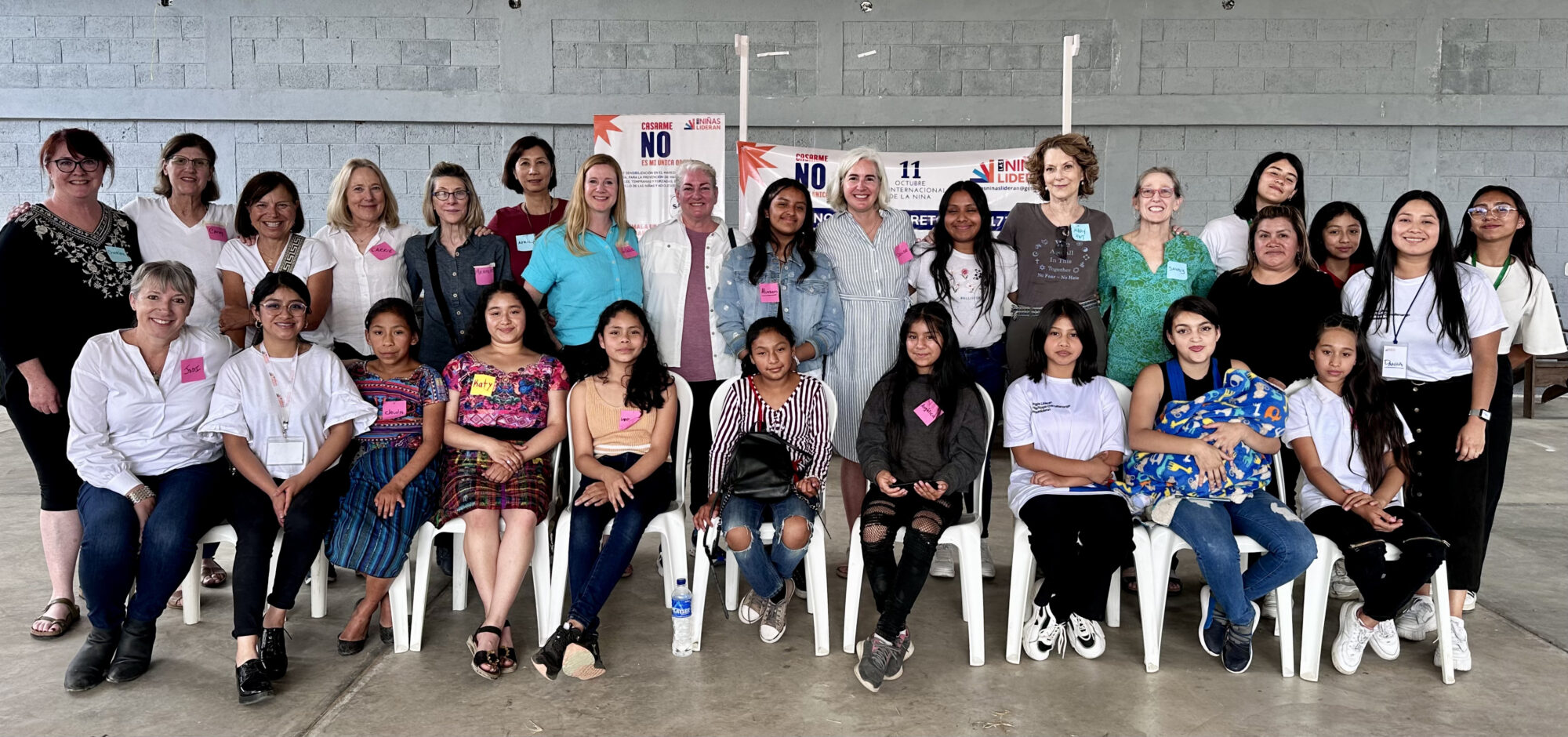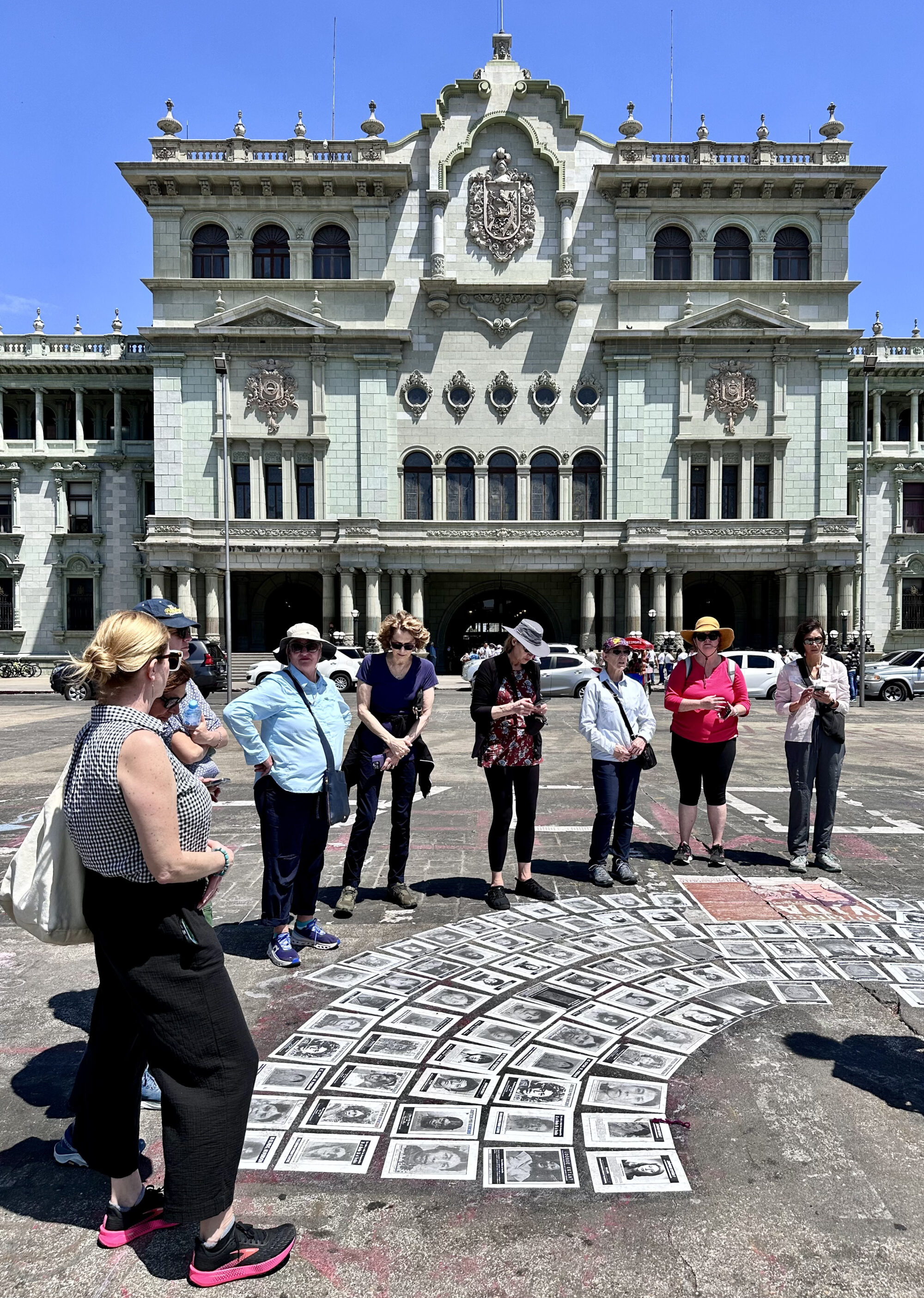By: Dr. Denise Raquel Dunning, Rise Up Founder & Executive Director

I recently spent a week in Guatemala with Rise Up’s Leadership Council on a trip led by Jodi Morris, a longtime supporter and Council member. This annual trip is an immersive opportunity for current and prospective Leadership Council members to see Rise Up’s work in Guatemala first-hand.
I lived in Guatemala for many years and have worked there since 2004. Having spent so much time in the country over the past twenty years, I didn’t expect to find anything in Guatemala that would surprise me. I was wrong.
We started our trip in Guatemala City, learning about the country’s 30-year civil war and genocide, U.S. interference in the region, and the present-day ramifications of these two intertwining histories. We got first-hand insight into the country’s very recent election, in which Bernardo Arevalo became the first president in decades to prioritize anti-corruption reforms and the rights of poor and indigenous communities. Our Guatemalan guide Judith explained how Arevalo’s landslide win was the result of a surprising and powerful alliance between indigenous community members who protested for months in the streets and progressive young people who amplified the grassroots movement online for the world to see.

Trigger warning: The next paragraph contains references to child abuse and rape.
We visited the Plaza Mayor, where we saw the tragic memorial to the 41 girls who were burned to death in a government-run children’s home in 2017 (BBC). We learned about how these girls had been systematically abused, raped, and drugged for years, and how – when they set their mattresses on fire to protest their treatment – the authorities locked them into the burning building so that they would not live to tell their stories. Six of the 41 girls did escape that day, and the hand-made memorials standing in front of the Palacio Nacional demand accountability for the murders of the 35 who didn’t survive. Imagining how those girls suffered for years at the hands of the adults who were charged with protecting them broke my heart all over again.
Leaving Guatemala City, our group traveled to Quetzaltenango, where we met with girls who are part of Las Niñas Lideran (Girls Lead), a girl-led network supported by Rise Up to advocate for the rights of girls and young women. The girl leaders told us about the problems they face in their communities – including that only 25% of indigenous 16-year-old girls finish high school (Center for Global Development), with the majority dropping out after elementary school because their families either can’t afford school fees or don’t see the value in educating girls. They also told us about the sharp increase in the incidence of rape, incest, and adolescent pregnancies in their community during and since the pandemic, when girls were often trapped at home with no escape from abusive fathers and relatives.

But the girl leaders didn’t just tell us about their problems – they also told us how they are creating solutions and leading change. They explained to us how they advocated for legislation to protect girls’ rights, partnered with their municipality to provide counseling to adolescent survivors of sexual violence, and created a curriculum and training manual so that adults could learn how better to provide girls with psychosocial support. The girls told us about “Cuentalo”, or “Talk About It,” a campaign they launched to raise awareness about gender-based violence and street harassment, and how they distributed whistles to girls and young women to use to get help in case of an attack. They created a Violence Meter that they used as a tool to educate girls, parents, teachers, religious leaders, and bus drivers about the many forms of violence that girls experience, ranging from bullying to femicide. They proudly told us how Las Niñas Lideran was chosen to represent Guatemala as part of the UN Generation Equality Forum to advocate with global leaders about the importance of prioritizing girls’ rights. And they did all of that on top of spending hours every day doing housework and chores, caring for younger siblings, helping with family businesses, and more.
After Quetzaltenango, we traveled to San Andres Itzapa, where we had the chance to visit the Las Niñas Lideran network in that region. We got to watch the young women in action, joining a meeting that they organized with the newly elected mayor to ask for his support. The advocates explained to the mayor that 30% of Guatemalan girls are pushed into early marriages, a devastating reality that limits girls’ ability to finish school, contributes to high rates of unwanted pregnancy, and often prevents girls from achieving their dreams (GNB). The young women described how they formed part of a coalition of activists and spent years advocating for passage of landmark legislation banning child marriage in Guatemala. They told the mayor that although this national ban is a crucial first step, Guatemala still has a very long way to go to protecting the rights of girls and young women. The girls proudly described the campaign they created, “ Casarme No Es Mi Única Opción” or “Marriage Is Not My Only Option” to raise awareness about the law and that they needed the mayor’s help to effectively implement the law and protect the rights of girls in San Andres Itzapa.
In addition to visiting with these inspiring young leaders, our group also traveled to Lake Atitlan, where we visited local women’s weaving cooperatives, sustainably grown coffee businesses, and met successful women entrepreneurs who are changing the norms of what is possible in a macho culture.
Guatemalan girls and women are creating change in the face of deeply entrenched patriarchal norms. I will never cease to be amazed by the strength, courage, and resilience of these powerful leaders who are standing up for justice. The trip served as a reminder that despite the enormity of the challenges they face, Guatemalan girls and women refuse to give up, working incredibly hard every day to build a better future.
*For all questions related to Rise Up’s Leadership Council and if you’re interested in joining Rise Up on a future trip, please contact Rise Up’s Development and Engagement Manager, Jen Byrne at jbyrne@riseuptogether.org.



